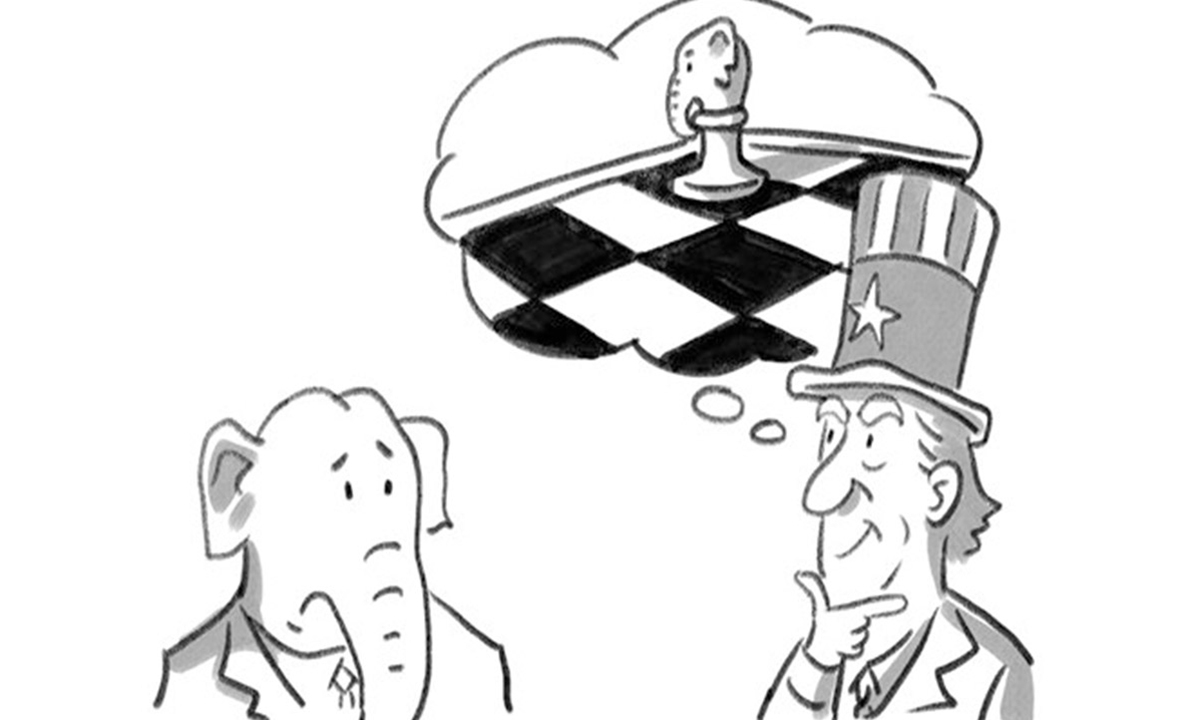
US-India Illustration: Liu Rui/GT
US President Donald Trump presented the Legion of Merit to Indian Prime Minister Narendra Modi on Tuesday for his leadership in elevating the US-India strategic partnership.
Not long ago, a military official from the US said that the US Army Alaska prepare to train with the Indian Army in the Himalayas. No response has yet been given from the Indian army. But it is more or less likely that armies from the two countries will take joint actions against China in the Himalayas. Will current close ties between Washington and New Delhi continue after Joe Biden assumes office?
India has gone too far on the path of ganging up with the US against China. Washington and New Delhi inked the Basic Exchange and Cooperation Agreement for Geo-Spatial Cooperation (BECA) in late October about a week before the US presidential election. The deal will enable India to obtain accurate geospatial data provided by the US and improve the accuracy of its missile and drone strikes. This also means that the Indian defense system will be monitored and manipulated by the US. On the surface, India sacrificed its own strategic and defense autonomy to balance perceived "China threat." But the truth is obvious: New Delhi is trying to profit from the major power competition between Beijing and Washington.
The Chinese Foreign Ministry has repeatedly emphasized and explained that what happened on the China-Indian border area was quite clear. The responsibility rests entirely with India. But the Indian side has been confusing right and wrong, accusing China of failing to abide by the bilateral agreement and protocols. It erroneously claims that China's soldiers "invaded" India. These lies could fool those who are not familiar with the border situation. But take a look at the border tensions India has with its neighboring countries. One should know who is to blame.
Tensions have arose over India's border with China, Pakistan and Nepal after the country unilaterally changed administrative divisions and issued a new political map in 2019 to draw disputed areas on its side of the border.
In the early stages of the COVID-19 pandemic, some Indian strategic elites mistakenly assumed that "China will be beset by internal and external difficulties", thus offering India an "unexpected opportunity to replace China" with their persistent hostility towards China. For this reason, New Delhi is willing to follow Washington and the West to use the epidemic as an excuse to smear China. This excuse is exploited to further promote economic decoupling, and commit massive infringements on the China-India border in disregard of China's representations. Yet again, New Delhi's wishful thinking has died on the vine. Not only has China managed to contain the epidemic, it has also become the only major economy to achieve positive economic growth for 2020. Its original desire to attract US companies moving out of China has failed as well.
What's more, after the US election is over, a question must be asked: will the Biden administration be as irrational as the Trump administration with its China policy? The answer to this question is always something of a mixed bag when it comes to the Modi government.
Some Senior Bharatiya Janata Party leaders have long acknowledged that a Biden and Harris administration could be bad for India-US relations because of differences in values. In recent years, the US State Department's annual report on international religious freedom has criticized the Modi government for stirring up domestic divisions. However, the Trump administration's double standard principle did not take these issues into account, so it has not become a friction point in India-US relations. But Joe Biden's administration is expected to speak plainly against India on these issues.
Paying much attention to values, Biden and Harris had criticized the Modi government during the election campaign. For example, both Biden and Harris have been highly critical of India's abrupt repeal of Article 370 in the India Constitution. This imposes strict controls in Indian-controlled Kashmir, and the introduction of amendments to the Citizenship Act and the registration system for new citizens - which is obviously discriminating against other religions.
Therefore, Dhruva Jaishankar, a fellow in foreign policy studies at Brookings India in New Delhi and the Brookings Institution in Washington DC, recently wrote in a Hindustan Times article that "there are several areas of structural difference between Indian and American democracy" and thus the two countries should have a dialogue on democracy.
Some Indian officials think they can take advantage with Harris's Indian roots to get along with the Biden administration. However, it may be disappointing for Indians to learn that although Harris doesn't deny her Indian roots, she prefers to call herself representative for black Americans and ethnic minorities.
In addition to structural differences, trade also won't be a highlight of ties between Modi and Biden. Moreover, there is a metaphorical time bomb in regard to defense cooperation between the two countries. NATO sanctioned Turkey for purchasing S-400 missile systems from Russia. What will happen to India as it has also bought the same systems? Prioritizing an anti-China campaign, US Secretary of State Mike Pompeo could turn a blind eye to that. But the Biden administration seems to have no reason to continue to do so.
India is making tough anti-China stances with a series of moves targeting China's military and technology. However, while these moves can meet the needs of Indian nationalist sentiments, they cannot increase India's leverage with border talks.
India sometimes overestimates its strength, particularly its capabilities to plan strategically. Does India have any leverage to make the US its strategic pawn? It would be more feasible for India to return to reason and meet China half way. After all, China has reiterated its willingness to maintain its peaceful India policies, despite the recent border conflicts.
The author is professor with the Institute of International Studies at Fudan University. opinion@globaltimes.com.cn


